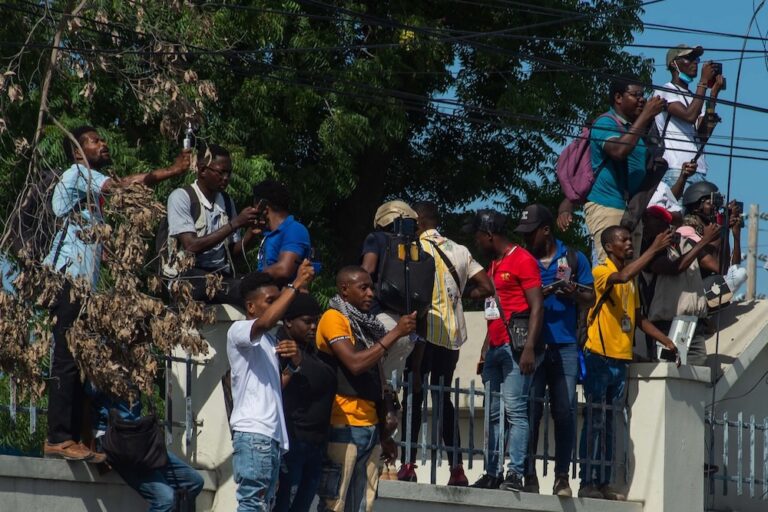(RSF/IFEX) – On 2 April 2008, the eve of the eighth anniversary of radio Haïti Inter director Jean Dominique’s murder, RSF said it was baffled by the failure to render justice in this case, especially as the existence of a clear political and judicial will to combat impunity in the past two years has resulted […]
(RSF/IFEX) – On 2 April 2008, the eve of the eighth anniversary of radio Haïti Inter director Jean Dominique’s murder, RSF said it was baffled by the failure to render justice in this case, especially as the existence of a clear political and judicial will to combat impunity in the past two years has resulted in convictions in two other cases of journalists’ murders.
Dominique and Haïti Inter’s caretaker, Jean-Claude Louissaint, were gunned down in the courtyard of the station on 3 April 2000.
“In the course of 2007, there were two convictions in the case of Brignol Lindor, the Radio Echo 2000 journalist who was murdered in Petit-Goâve in 2001, and one conviction in the case of Jacques Roche, the editor of the cultural section of the daily “Le Matin”, who was kidnapped and murdered in Port-au-Prince in 2005,” RSF said.
“At the same time, investigations into more recent cases led to quick arrests,” the press freedom organisation continued. “And on 10 August 2007, President René Préval, a friend of Dominique’s, installed an Independent Commission to Support Investigations into Murders of Journalists (CIAPEAJ) in the presence of Dominique’s widow, Michèle Montas. The political and judicial will is there, and we now have proof that impunity is not inevitable.”
The organisation added: “This makes it all the harder to explain why the Dominique case is alone in going nowhere, eight years after his murder. Political factors may have had an impact but they offer no justification for the failure to ever solve this case.”
The investigation into the murder of Dominique and Louissaint concluded on 21 March 2003. It resulted in six men being charged and arrested: Dymsley “Ti Lou” Milien, Jeudi “Guimy” Jean-Daniel, Philippe Markington, Ralph Léger, Freud Junior Demarattes and Ralph Joseph. The charges against the last three were dismissed on 4 August 2003, after they appealed against the indictment.
“Ti Lou”, “Guimy” and Markington managed to escape during a prison mutiny in February 2005. Markington fled to Argentina, from where he contacted RSF to insist on his innocence. “Ti Lou” and “Guimy” went back to being gang leaders in the Port-au-Prince neighbourhood of Martissant. “Ti Lou” is now dead.
Former Port-au-Prince deputy mayor Harold Sévère (now in self-imposed exile) and Ostide “Douze” Pétion were arrested on 14 March 2004 as the suspected instigators of the murder. Annette Auguste, who was already being held in connection with other criminal activity, was also accused of involvement on 10 May 2005.
But none of these three has ever been interrogated. There has never been any attempt to verify presumed hit-man “Ti Lou”‘s statement that he was paid USD $10,000 to murder Dominique. Moreover, the death of two witnesses in suspicious circumstances has never been explained.
The Supreme Court ordered the case reopened on 29 June 2004. But it took nearly a year for a new investigating judge to be appointed, on 3 April 2005, exactly five years after the murder, and the new judge has not had access to the files and has not been given the necessary resources. In all, six judges have been in charge of the investigation, one after another.
The case suffered another setback on 4 April 2007 with the murder of Robert Lecorps, a businessman who was also suspected of involvement in Dominique’s murder. Police superintendent Daniel Ulysse, who was head of the judicial police at the time of Dominique’s murder, was arrested on 10 December 2007 on suspicion of having obstructed the investigation. But the police took nearly a month to execute the warrant for his arrest that was issued by judge Fritzner Fils-Aimé, now in charge of the case.
It has never been possible to corroborate the statements of former senator Dany Toussaint, who has often been cited as a suspect in the case. And since the start of this year, Judge Fils-Aimé has been trying to obtain a statement from senate vice-president Rudolph Boulos, the owner of the pharmaceutical company Pharval.
Shortly before his murder, Dominique spoke on the air about Afébril, a contaminated cough mixture produced and distributed by Pharval that allegedly caused the death of about 100 children in 1996. The CIAPEAJ, the commission created by President Préval, wrote to the senate president on 17 February calling for Senator Boulos to respond to the summonses issued by Fils-Aimé. In a reply one week later, Boulos refused on the grounds of “parliamentary immunity.”


